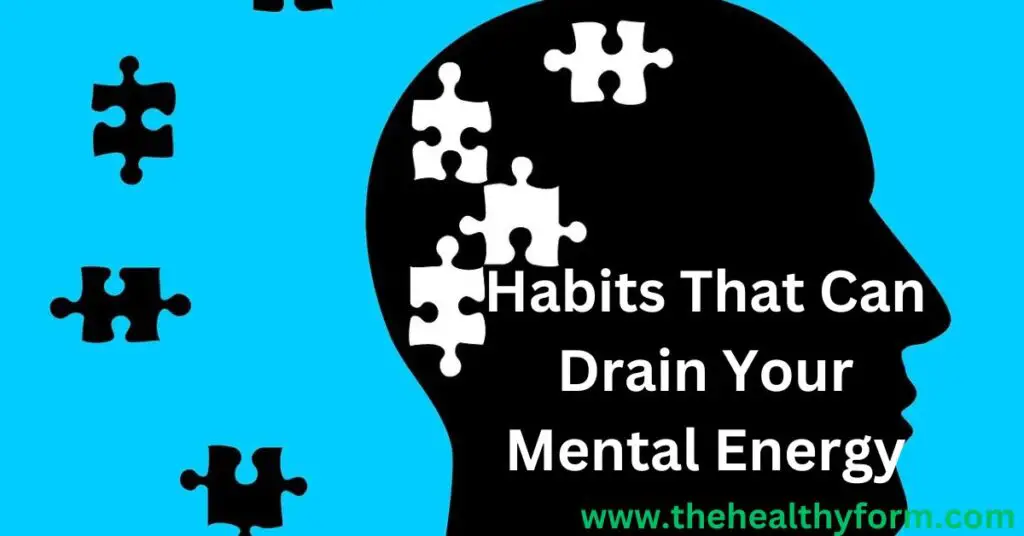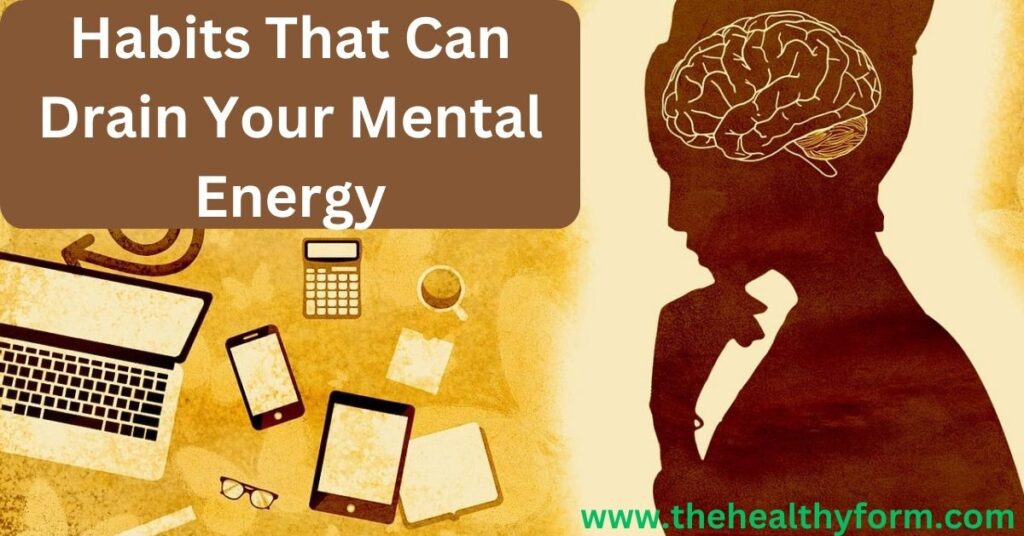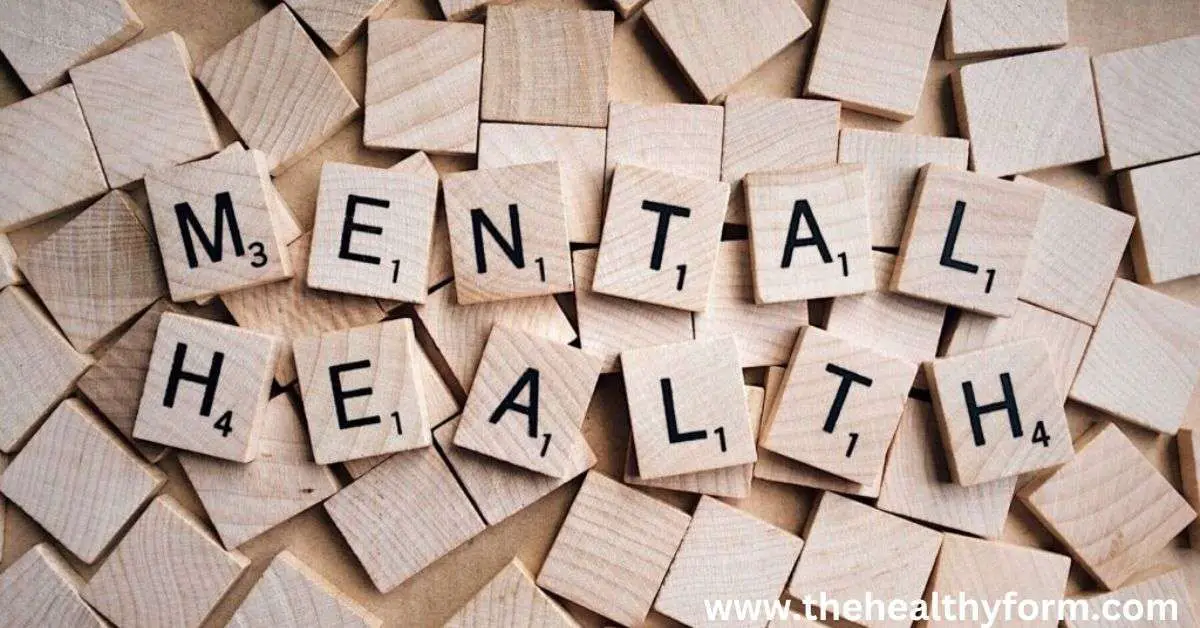Habits That Can Drain Your Mental Energy
Unnoticed habits that drain your mental energy and learn how to regain focus and mental vitality. Explore expert insights on overcoming these brain energy draining behaviors for a clearer, more productive mind. These common behaviors and their effects on your mental stamina.
Mental energy is like the fuel that keeps your brain humming smoothly. Just as a car burns more fuel when stuck in traffic, certain habits can burn through your mental energy faster than you’d like. In this article, we will uncover some of these sneaky habits that can leave you feeling mentally drained, and more importantly, we’ll explore how you can turn things around. So, let’s dive in and shed some light on the habits that might steal your mental mojo.
Multitasking Overload and Mental Energy
Have you ever checked emails while listening to a colleague in a meeting, only to realize you missed crucial points? That’s the sign of multitasking overload, a modern challenge that can exhaust your mental energy without you realizing it. In this digital age, where we’re often praised for handling numerous tasks simultaneously, it’s important to understand why multitasking might be more draining than you think.
The Allure of Multitasking
Multitasking may sound like an efficient way to get more done in less time. After all, who wouldn’t want to simultaneously tackle emails, social media, and a work assignment? However, beneath its shiny facade lies a cognitive reality that can hinder your mental vitality.

How Multitasking Works
When you multitask, your brain switches rapidly between tasks. It sounds impressive, but this constant shifting comes at a cost. Instead of enhancing productivity, it drains mental energy. Here’s why:
- Reduced Focus: The human brain isn’t designed to divide its attention effectively. When you juggle multiple tasks, your focus on each task diminishes, leading to reduced accuracy and slower completion times.
- Cognitive Load: Each task requires cognitive resources. The more tasks you add, the heavier the cognitive load becomes. This can lead to mental fatigue and decreased overall performance.
- Lower Quality Output: Multitasking can compromise the quality of your work. Mistakes are more likely, details are missed, and creativity takes a hit.
- Increased Stress: Rapid task-switching triggers stress responses in your brain, elevating cortisol levels. This drains your mental energy and can harm your overall well-being.
- Longer Completion Time: Contrary to the belief that multitasking saves time, research shows that shifting between tasks increases the time it takes to complete them.
The Myth of Efficient Multitasking
While we might feel accomplished when handling multiple tasks simultaneously, it’s often a mirage. Your brain’s efficiency is diminished, and the tasks you complete might not be your best work. You might end up spending more time correcting mistakes and revisiting unfinished tasks.
Simple Ways to Combat Multitasking Overload
The good news is that you can break free from the multitasking trap:
- Prioritize Tasks: Instead of trying to do everything simultaneously, prioritize tasks based on their importance and deadlines. Focus on one task at a time.
- Practice Single-Tasking: Train your brain to concentrate on a task without distractions. Turn off notifications and create dedicated work periods.
- Take Breaks: Frequent breaks can recharge your mental energy. Use techniques like the Pomodoro method, working for 25 minutes and then taking a 5-minute break.
- Mindful Presence: When engaged in a task, give it your full attention. Engage your senses and immerse yourself in the experience.
- Embrace Boredom: Allow yourself moments of stillness. Boredom can spark creativity and give your brain the chance to rejuvenate.
Digital Devices and Mental Energy
You wake up, reach for your smartphone, and the cycle begins. Emails, social media updates, news notifications—your digital devices have become an inseparable part of your day. However, this constant connectivity has hidden consequences that may drain your mental energy more than you realize. Let’s delve into digital device dependence and explore its impact on your cognitive well-being.

The Digital Web: A Double-Edged Sword
In today’s fast-paced world, digital devices like smartphones, tablets, and laptops have become extensions of ourselves. They keep us informed, entertained, and connected to a global community. However, digital device dependence refers to the overreliance on these devices, leading to various issues that can adversely affect our mental energy.
Unmasking the Energy Drain
Notifications Overload: The persistent pings and buzzes of notifications seize your attention throughout the day. These interruptions disrupt your focus, leading to “context-switching fatigue.” This constant switching between tasks drains your mental energy, making it harder to concentrate and complete tasks efficiently.
Information Overload: The digital era has blessed us with a flood of information, but it comes at a cost. Scrolling through endless streams of news, emails, and social media updates burdens your brain with an excessive cognitive load. As a result, your ability to process information effectively dwindles, leaving you mentally tired.
Blue Light Blues: The screens we stare at emit blue light, which can interfere with your sleep cycle and circadian rhythm. Excessive exposure to screens, especially before bedtime, can disrupt sleep quality, leading to daytime tiredness and mental fogginess.
Social Media Scenarios: While social media connects us, it can also contribute to a sense of “social comparison“—constantly evaluating our lives against others. This affects our self-esteem and occupies valuable mental space that could be used more productively.
Strategies to Reclaim Your Mental Energy
Mindful Engagement: Turn off non-essential notifications to regain control over your attention. Designate specific times to check emails and social media, reducing constant interruptions.
Digital Detox: Dedicate technology-free periods in your day, allowing your mind to rest and recharge. Use this time for activities promoting relaxation, such as reading, walking, or enjoying nature.
Screen Time Limits: Set daily screen time limits for different apps and activities. Many devices now offer built-in features to help you track and manage your screen time.
Digital-Free Bedrooms: Create a tech-free zone in your bedroom to improve your sleep quality. Make it a habit to disconnect from screens at least an hour before bedtime.
Engage in Physical Activities: Exercise benefits your physical health, helps clear your mind, and boosts your mental energy. Spend time engaging in outdoor activities or practicing yoga to balance your screen time.
Negative Self-Talk and Mental Energy
You’re sitting at your desk, working on a project. Suddenly, a voice inside your head starts criticizing your abilities. “You’re not good enough,” it says. This internal chatter is negative self-talk, and it’s more powerful than you might realize. In this article, we’ll delve into the world of negative self-talk, understand its impact, and discover how you can break free from its grasp.
Understanding Negative Self-Talk
Negative self-talk is like a never-ending loop of pessimism that plays in your mind. That harsh inner voice constantly judges, criticizes and doubts your every move. It might sound like, “I can’t do this,” “I’m a failure,” or “I’ll never get it right.” These self-defeating thoughts can infiltrate your consciousness and influence your self-perception.
The Impact on Your Well-Being
Negative Impact on Self-Esteem: Imagine having a friend who always points out your flaws and shortcomings. That’s what negative self-talk does to your self-esteem. Constant self-criticism erodes your confidence, making you doubt your abilities and worth.
Stress and Anxiety: Negative self-talk is a breeding ground for stress and anxiety. When you consistently tell yourself you’re not good enough, your body responds with stress. This chronic stress can lead to heightened anxiety levels.
Limiting Potential: Negative self-talk is a barrier that stops you from reaching your full potential. It convinces you to stay within your comfort zone, preventing you from taking risks or pursuing your dreams.
Breaking Free from the Cycle
- Awareness: The first step is recognizing negative self-talk when it arises. Pay attention to your thoughts and identify patterns of self-criticism. This awareness is crucial for initiating change.
- Challenge the Thoughts: When a negative thought emerges, challenge it. Ask yourself if there’s evidence to support it. Would you speak to a friend the way you’re speaking to yourself?
- Replace with Realistic Thoughts: Replace negative thoughts with more realistic and compassionate ones. Instead of “I’m a failure,” try “I’m learning and growing.”
- Practice Self-Compassion: Treat yourself with kindness and understanding. Imagine how you would console a friend going through a tough time. Extend that same compassion to yourself.
- Mindfulness and Meditation: Mindfulness techniques can help you distance yourself from negative thoughts. Meditation teaches you to observe your thoughts without judgment, reducing their impact.
Lack of Sleep and Mental Energy
When you wake up tired, feeling like you’ve already run a marathon before your feet even touch the floor. You’re not alone in this struggle. Lack of sleep can be a silent but powerful drain on your mental energy, affecting how you think, feel, and navigate your day. In this article, we’ll dive into the profound impact of insufficient sleep on your mental well-being and offer practical solutions to help you reclaim your vitality.
Understanding the Sleep-Mental Energy Connection
Imagine your brain as a busy factory that works tirelessly throughout the day. Like any other machine, it needs rest to recharge and function optimally. This is where sleep comes in. When you sleep, your brain engages in essential processes that consolidate memories, process emotions, and repair cellular damage. It’s like a reset button for your mind, allowing you to wake up refreshed and ready to take on the world.
The Toll of Inadequate Sleep
When you don’t get enough sleep, your mental energy reserves start depleting. Here’s why:
- Impaired Cognitive Function: Imagine your brain as a car engine. Without proper sleep, it struggles to function efficiently. Lack of sleep impairs your cognitive functions, making it harder to concentrate, solve problems, and make decisions. Your brain feels foggy, and even simple tasks become challenging.
- Emotional Turmoil: Sleep deprivation isn’t just about feeling tired. It messes with your emotions, leaving you more vulnerable to stress, irritability, and mood swings. It’s like trying to navigate a stormy sea without a sturdy ship.
- Reduced Attention Span: Think of attention as a spotlight. With insufficient sleep, that spotlight becomes dim, making it harder to focus on tasks. You become easily distracted, leading to decreased productivity and frustration.
- Memory Hiccups: Sleep plays a crucial role in memory consolidation. Without it, your brain struggles to store and retrieve information efficiently. Have you ever had trouble remembering names or where you left your keys after a sleepless night? It’s the brain’s way of protesting against the lack of downtime.
- Weakened Problem-Solving Skills: Imagine trying to solve a complex puzzle with a tired mind. Lack of sleep makes your problem-solving skills sluggish, making challenges seem insurmountable.
Reclaiming Your Mental Energy Through Sleep
The good news is that you have the power to turn this around. Here’s how:
- Prioritize Sleep: Make sleep a non-negotiable part of your routine. Aim for 7-9 hours of quality sleep each night.
- Create a Sleep-Friendly Environment: Keep your bedroom dark, quiet, and cool. Invest in a comfortable mattress and pillows.
- Establish a Routine: Train your body to recognize sleep cues. Go to bed and wake up simultaneously every day, even on weekends.
- Unplug Before Bed: The blue light emitted by screens interferes with your body’s production of melatonin, a sleep-inducing hormone. Disconnect from screens at least an hour before bedtime.
- Limit Caffeine and Heavy Meals: Avoid caffeine and heavy meals close to bedtime, as they can disrupt your sleep cycle.
- Manage Stress: Engage in relaxation techniques such as deep breathing, meditation, or gentle stretching before bedtime to calm your mind.
Unhealthy Eating Habits and Mental Energy
Regarding our overall well-being, what we put on our plates matters more than we often realize. Unhealthy eating habits can sneakily drain our mental energy, affecting our physical health, cognitive function, and emotional balance. Your diet might rob you of mental vitality and offer simple solutions to make positive changes.
The Sugar Trap
Sugar, that sweet temptation that hides in our foods, can play a big role in sapping your mental energy. Consuming too much sugar leads to rapid spikes and crashes in blood sugar levels. These energy rollercoasters can leave you feeling sluggish, irritable, and struggling to concentrate. Think of those times when a sugary treat gave you a temporary high, followed by a mental slump.
Processed Foods and Brain Fog
Processed foods, often packed with artificial additives and unhealthy fats, can contribute to that pesky brain fog you might experience. These foods lack the essential nutrients your brain needs to function optimally. Instead of supporting your mental clarity, they can leave you feeling fuzzy-headed and unable to think clearly.
Dehydration and Cognitive Strain
Dehydration is a silent culprit that many of us overlook. When you’re not adequately hydrated, your brain has to work harder to complete simple tasks. This can lead to difficulty concentrating, memory lapses, and general fatigue. Imagine driving a car with an empty gas tank – that’s what dehydration does to your mental energy.
Lack of Nutrient-Dense Foods
A diet lacking nutrients like fruits, vegetables, whole grains, lean proteins, and healthy fats robs your brain of essential vitamins and minerals. These nutrients are the building blocks for neurotransmitters – chemicals that transmit signals in your brain. When you skimp on these nutrients, your brain’s communication system can go haywire, affecting your mood and cognitive function.
Finding Your Way Back to Mental Energy
Balance is the key. Incorporating a variety of whole foods into your diet can make a difference. Opt for complex carbohydrates like whole grains, which provide a steady stream of energy. Include lean proteins that help keep you full and support brain health. Don’t forget those healthy fats like avocados, nuts, and fatty fish – they’re like brain fuel.
Hydration is vital. Aim to drink enough water throughout the day. Set reminders or carry a reusable water bottle if you struggle to remember. Your brain will thank you for keeping it well-hydrated.
Cut back on sugary treats and processed foods. Instead of sugary snacks, reach for whole fruits or a handful of nuts. Swap out processed foods for homemade meals rich in colorful vegetables and lean proteins.
Constant Worrying and Mental Energy
In the quiet chambers of our minds, a relentless companion often lurks – the habit of constant worrying. This subtle saboteur can seep into our thoughts, draining our mental energy and casting shadows on our peace. This exploration will delve into the intricacies of constant worrying, unmask its effects, and unveil strategies to liberate our minds from its grip.
Understanding Constant Worrying
Constant worrying isn’t merely a fleeting concern or a sporadic thought. It’s a constant loop of anxiety that replays in our minds, often about situations that may never transpire. This cycle of overthinking can evolve into a self-perpetuating cycle, spiraling into the depths of anxiety and mental exhaustion. Often irrational and catastrophic, these thoughts can wrap around us like a suffocating shroud, impacting our daily lives and overall well-being.
The Weight of Mental Energy Drain
Picture your mental energy as a limited resource – a precious wellspring that powers your thoughts, decisions, and actions. Now, imagine constant worrying as a leak in this reservoir. The more we worry, the more mental energy we lose. This can lead to mental fatigue, making concentrating on tasks, solving problems, or engaging in enjoyable activities difficult. The constant hum of anxiety prevents us from being fully present, rendering us captive to thoughts that offer no resolution.
Effects on Emotional Well-being
The emotional toll of constant worrying is significant. It can create an atmosphere of perpetual tension, eroding our sense of calm and triggering feelings of unease. This prolonged stress response can result in irritability, mood swings, and even symptoms of depression. Moreover, as we meditate over possible scenarios, our minds become a breeding ground for negativity, potentially leading to a distorted perception of reality.
Breaking Free from the Cycle
Liberation from the chains of constant worrying is possible, but it requires intentional effort and compassionate self-awareness.
Mindfulness: Mindfulness is a practice that encourages us to observe our thoughts without judgment. By cultivating this skill, we can step back from our worries, recognizing them as passing clouds rather than unmovable truths.
Grounding Techniques: When worries overwhelm us, grounding techniques can anchor us to the present moment. Techniques such as deep breathing, focusing on sensory experiences, or repeating affirmations can redirect our attention from spiraling thoughts.
Problem-Solving Approach: Adopting a problem-solving approach can be empowering if your worries stem from real concerns. Identify the specific issue, brainstorm solutions, and take actionable steps to address it. This shift from ruminating to taking action can alleviate some mental burdens.
Establishing Worry Time: Designating a specific time for worrying can help contain its impact. When worries arise outside of this designated time, remind yourself that you’ll address them during your worry period.
Professional Guidance: If constant worrying significantly impacts your daily life, seeking the guidance of a mental health professional can be invaluable. Therapists can provide tools to manage anxiety, challenge negative thought patterns, and foster a healthier relationship with your mind.
Overcommitting and Mental Energy
Imagine a plate overflowing with many tasks, commitments, and responsibilities. In our quest to please others and fulfill every request, we often find ourselves trapped in the cycle of overcommitting and saying “yes” to everything. While this might seem like a way to be helpful and productive, it can lead to a significant drain on your mental energy.
Understanding Overcommitting
Overcommitting is the art of spreading oneself too thin. It’s that feeling of agreeing to one too many things, often driven by a desire to be accommodating and not disappoint anyone. The trouble is, the more we overcommit, the less time and energy we have for ourselves.
The Yes Trap
Saying “yes” is a wonderful thing. It signifies openness, willingness, and a generous spirit. However, it can be detrimental when saying “yes” becomes a habit, even when it stretches you thin. You might find yourself agreeing to tasks, events, and responsibilities that you don’t have the capacity for. This can lead to exhaustion, stress, and feeling overwhelmed.
The Cost of Saying Yes to Everything
You spread your mental energy across many tasks when you say “yes” to everything. Here’s how it drains you:
Diluted Focus: Your focus gets diluted because you’re juggling numerous tasks at once. This can lead to reduced productivity and a feeling of not doing anything justice.
Stress and Anxiety: Overcommitting creates a constant state of stress. The pressure to meet all commitments can lead to anxiety, worry, and even burnout.
Lack of Quality Time: When you’re stretched thin, the time you can dedicate to each task or relationship decreases. This can impact the outcomes and your satisfaction with them.
Loss of Personal Time: Overcommitting steals your time and self-care moments. This leaves you with no time to recharge and care for your needs.
Breaking Free from the Yes Cycle
Prioritize and Assess: Before saying “yes,” take a moment to evaluate your existing commitments and energy levels. Is this new commitment aligned with your priorities and feasible within your capacity?
Learn to Say No: Saying “no” isn’t a sign of selfishness. It’s a way to protect your mental well-being and ensure you’re giving your best to the things that matter most.
Set Boundaries: Clearly define your boundaries and communicate them to others. Let people know what you can and cannot commit to realistically.
Practice Self-Care: Prioritize self-care and personal time. When you care for yourself, you have more to give to others without draining your mental energy.
Dehydration and Mental Health
The brain, that intricate command center, orchestrates our thoughts, emotions, and actions. Now, imagine it in need – not of complex algorithms or enigmatic solutions, but of something simpler, something as basic as water. The surprising truth is that hydration, or the lack of it, can significantly impact our mental well-being. In this journey, we will unravel the fascinating connection between staying hydrated and nurturing a healthy mind.
The Hidden Power of Water for Mental Health
Understanding Dehydration
Dehydration occurs when your body loses more water than it takes in. While we often associate dehydration with physical symptoms like thirst and dry skin, its effects on mental health are just as profound.
The Brain’s Vital Dependence on Water
Picture the brain as a delicate machine. Every thought, every decision, every emotion relies on a series of intricate chemical reactions. Water is the unsung hero, the lubricant that keeps the cogs turning smoothly. When dehydration strikes, this lubricant becomes scarce, and the machinery falters.
The Mind-Body Connection
Our bodies are a unified orchestra, where every instrument’s tune affects the harmony of the whole. Dehydration creates a discordant note. As the brain struggles without sufficient water, its ability to regulate mood, focus, and cognitive function is compromised.
Dehydration’s Impact on Mental Health: The Intricate Effects
Cognitive Fog
Dehydration can feel like a mental fog settling in. Concentration wanes, memory blurs, and even routine tasks become challenging. It’s as if the gears of a well-oiled machine have suddenly started to grind.
Mood Swings and Irritability
Have you ever experienced sudden irritability or mood swings? Dehydration could be the culprit. As the brain loses equilibrium, emotions sway like a pendulum, often leading to frustration, anxiety, and melancholy.
Stress Amplification
Dehydration amplifies stress. Stress hormones surge, and the brain, already tired due to lack of hydration, struggle to manage this influx. The result? A vicious cycle that heightens feelings of anxiety and tension.
Slowed Decision-Making
Dehydration can slow down your mental gears in a world that demands quick decisions. Processing information and making choices becomes sluggish, akin to slogging through mud.
Altered Sleep Patterns
Dehydration can disrupt sleep patterns. With an imbalanced internal environment, falling and staying asleep becomes challenging, leading to tiredness and further impacting mental clarity.
Nurturing Mental Well-being through Hydration
Prioritizing Hydration
Understanding the vital role of water in mental health is the first step. Prioritize hydration by sipping water throughout the day, especially when engaging in mental tasks or physical activity.
Listening to Thirst Signals
The body often sends signals when it needs hydration. Listen to your thirst cues and respond promptly, even before feeling excessively thirsty.
Balancing Nutrition
Certain foods, like fruits and vegetables, contribute to your hydration levels. Incorporate water-rich foods into your diet for added hydration support.
Mindful Hydration
Practice mindful drinking. Instead of hurriedly gulping water, take deliberate sips and savor the experience. This can heighten your awareness of hydration needs.
Conclusion
In life’s journey, our mental energy is like a precious resource that fuels our thoughts, decisions, and actions. It’s important to be mindful of the habits that can drain this valuable energy. From multitasking overload to negative self-talk, each habit has the power to wear down our cognitive reserves.
But the good news is awareness is the first step toward positive change. We hold the key to reclaiming our mental vitality by recognizing these energy-draining habits. We can find balance by prioritizing restful sleep, embracing healthier tech habits, and nourishing our bodies with good food and exercise.





